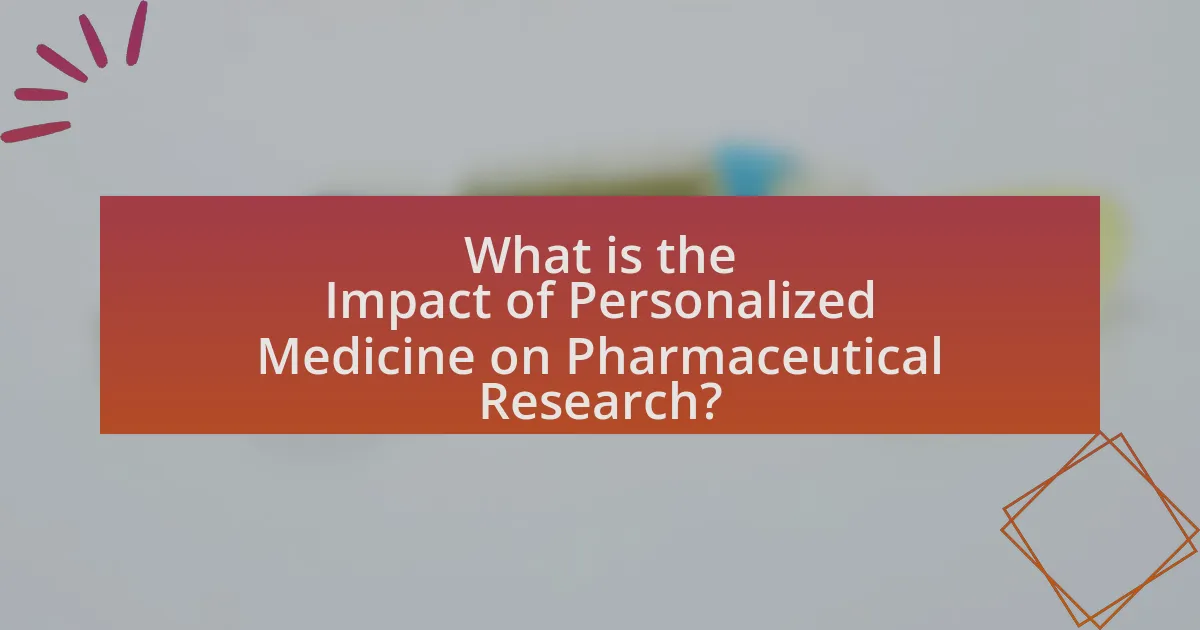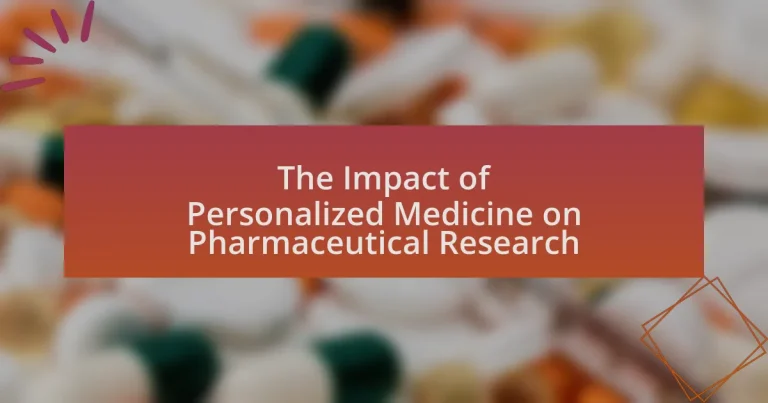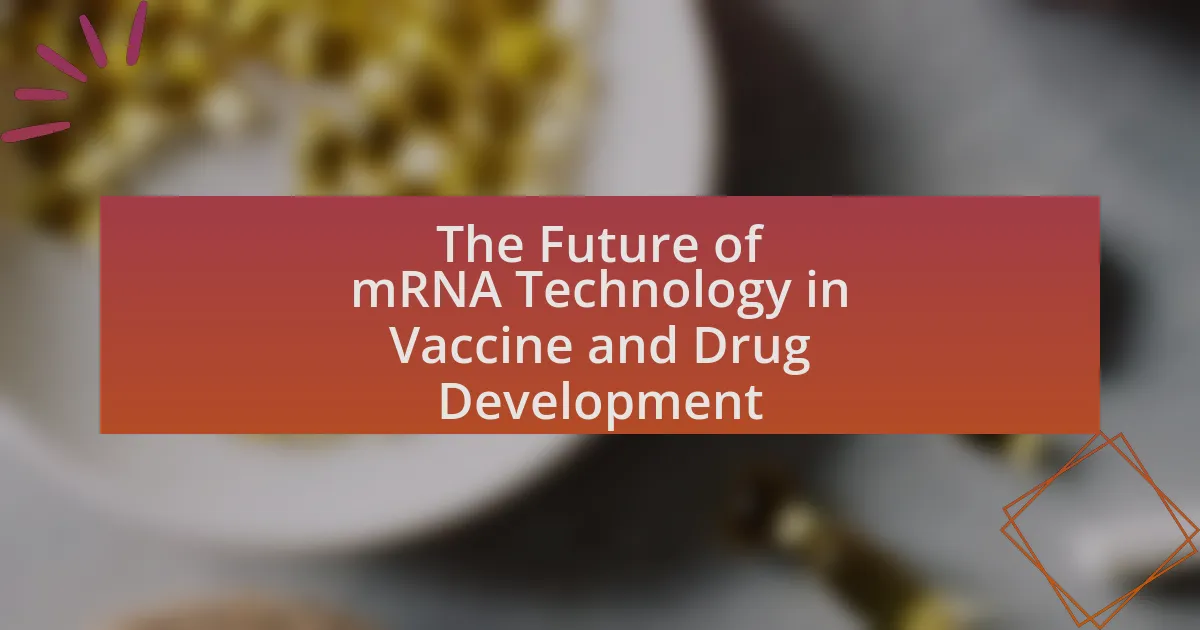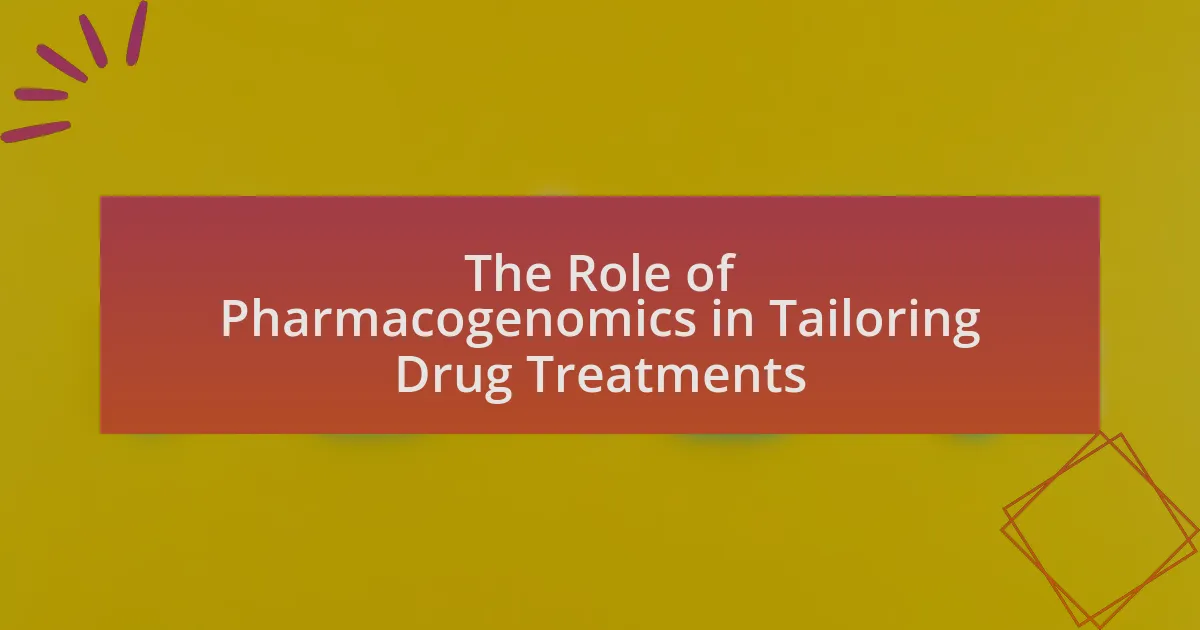Personalized medicine is revolutionizing pharmaceutical research by moving away from traditional one-size-fits-all approaches to tailored therapies based on individual genetic profiles. This shift enhances drug efficacy and safety, exemplified by targeted therapies like trastuzumab for HER2-positive breast cancer. The article explores the differences between personalized and traditional medicine, key principles of personalized medicine, historical developments, and the role of technological advancements. It also addresses challenges such as regulatory hurdles and ethical considerations, while highlighting the impact of data analytics and big data on improving patient outcomes. Future trends, including the integration of artificial intelligence and potential breakthroughs, are discussed, emphasizing best practices for researchers in this evolving field.
What is the Impact of Personalized Medicine on Pharmaceutical Research?

Personalized medicine significantly transforms pharmaceutical research by shifting the focus from a one-size-fits-all approach to tailored therapies based on individual genetic profiles. This paradigm shift enhances drug efficacy and safety, as treatments can be optimized for specific patient populations, leading to more successful clinical outcomes. For instance, the development of targeted therapies, such as trastuzumab for HER2-positive breast cancer, exemplifies how understanding genetic markers can improve treatment effectiveness. Additionally, personalized medicine fosters the integration of biomarkers in drug development, which accelerates the identification of suitable patient cohorts for clinical trials, thereby increasing the likelihood of regulatory approval and market success.
How does personalized medicine differ from traditional medicine?
Personalized medicine differs from traditional medicine by tailoring medical treatment to the individual characteristics of each patient, such as their genetic makeup, lifestyle, and environment. Traditional medicine typically employs a one-size-fits-all approach, where treatments are based on the average response of a population rather than the specific needs of an individual. For example, personalized medicine utilizes genetic testing to identify the most effective therapies for conditions like cancer, leading to improved outcomes and reduced side effects, as evidenced by studies showing that targeted therapies can significantly enhance survival rates in specific patient populations.
What are the key principles of personalized medicine?
The key principles of personalized medicine include the use of genetic information, patient-centered care, and targeted therapies. Personalized medicine tailors medical treatment to the individual characteristics of each patient, particularly their genetic makeup, which allows for more effective and precise interventions. For instance, the identification of specific genetic mutations can guide the selection of targeted therapies, improving treatment outcomes. Studies have shown that this approach can lead to better responses in conditions like cancer, where therapies are designed based on the genetic profile of tumors, demonstrating the efficacy of personalized medicine in enhancing patient care.
How does personalized medicine influence treatment plans?
Personalized medicine significantly influences treatment plans by tailoring therapies based on individual patient characteristics, such as genetics, environment, and lifestyle. This approach allows healthcare providers to select the most effective treatments for specific patient profiles, improving outcomes and minimizing adverse effects. For instance, in oncology, targeted therapies like trastuzumab for HER2-positive breast cancer demonstrate how personalized medicine can lead to better responses compared to traditional one-size-fits-all treatments. Studies indicate that patients receiving personalized therapies experience higher survival rates and reduced toxicity, validating the effectiveness of this approach in enhancing treatment efficacy.
What are the historical developments leading to personalized medicine?
The historical developments leading to personalized medicine include the discovery of DNA structure in 1953, which laid the groundwork for understanding genetic variation. The completion of the Human Genome Project in 2003 further advanced this field by mapping the entire human genome, enabling researchers to identify genetic markers associated with diseases. Additionally, the rise of pharmacogenomics in the late 1990s highlighted how individual genetic differences affect drug metabolism and efficacy, paving the way for tailored therapies. These milestones collectively contributed to the evolution of personalized medicine, emphasizing the importance of individual genetic profiles in treatment strategies.
What milestones have shaped the evolution of personalized medicine?
The evolution of personalized medicine has been shaped by several key milestones, including the completion of the Human Genome Project in 2003, which mapped the entire human genome and provided a foundation for understanding genetic variations. The introduction of targeted therapies, such as trastuzumab for HER2-positive breast cancer in 1998, demonstrated the effectiveness of tailoring treatments based on specific genetic markers. Additionally, the rise of pharmacogenomics, which studies how genes affect a person’s response to drugs, has led to more precise medication dosing and selection, improving patient outcomes. The FDA’s approval of the first companion diagnostic test in 2011 further solidified the integration of genetic testing in treatment decisions, marking a significant step towards personalized approaches in medicine. These milestones collectively illustrate the transition from a one-size-fits-all model to a more individualized strategy in healthcare.
How have technological advancements contributed to personalized medicine?
Technological advancements have significantly enhanced personalized medicine by enabling precise diagnostics and targeted therapies. Innovations such as next-generation sequencing allow for the detailed analysis of an individual’s genetic makeup, facilitating the identification of specific biomarkers associated with diseases. For instance, the use of genomic data has led to the development of targeted cancer therapies, which are tailored to the genetic profile of tumors, improving treatment efficacy and reducing side effects. Additionally, advancements in data analytics and artificial intelligence have streamlined the interpretation of complex biological data, allowing for more accurate predictions of treatment responses. These technologies collectively contribute to a more individualized approach in healthcare, ultimately improving patient outcomes and optimizing therapeutic strategies.
What challenges does personalized medicine present to pharmaceutical research?
Personalized medicine presents significant challenges to pharmaceutical research, primarily due to the complexity of developing treatments tailored to individual genetic profiles. This complexity requires extensive genomic data analysis and the integration of diverse biological information, which can complicate the drug development process. Additionally, regulatory frameworks are often not equipped to handle the rapid advancements in personalized therapies, leading to uncertainties in approval processes. For instance, the FDA has acknowledged the need for updated guidelines to accommodate the unique aspects of personalized medicine, which can delay the introduction of new therapies. Furthermore, the high costs associated with personalized treatments can limit patient access and create disparities in healthcare, posing ethical and logistical challenges for pharmaceutical companies.
How do regulatory hurdles affect the development of personalized medicine?
Regulatory hurdles significantly slow the development of personalized medicine by imposing stringent requirements for clinical trials and approval processes. These regulations often necessitate extensive data collection and validation to demonstrate the safety and efficacy of tailored therapies, which can lead to increased costs and longer timelines for bringing new treatments to market. For instance, the U.S. Food and Drug Administration (FDA) has specific guidelines for the approval of companion diagnostics, which are essential for personalized therapies, requiring rigorous evidence of clinical utility. This regulatory landscape can deter investment and innovation in personalized medicine, as companies may face uncertainty regarding the approval pathways and potential market access for their products.
What ethical considerations arise in personalized medicine research?
Ethical considerations in personalized medicine research include issues of informed consent, data privacy, and potential discrimination. Informed consent is crucial as participants must fully understand how their genetic information will be used, which can be complex and challenging to communicate effectively. Data privacy concerns arise from the sensitive nature of genetic data, necessitating robust safeguards to prevent unauthorized access and misuse. Additionally, there is a risk of discrimination based on genetic information, which could affect insurance coverage and employment opportunities. These considerations highlight the need for ethical frameworks that protect individuals while advancing personalized medicine.
How does personalized medicine enhance drug development processes?
Personalized medicine enhances drug development processes by tailoring treatments to individual patient characteristics, which increases the efficacy and safety of new therapies. This approach utilizes genetic, biomarker, and phenotypic information to identify which patients are most likely to benefit from a specific drug, thereby streamlining clinical trials and reducing the time and cost associated with drug development. For instance, the use of companion diagnostics in oncology has led to more targeted therapies, such as trastuzumab for HER2-positive breast cancer, demonstrating improved patient outcomes and more efficient resource allocation in clinical trials.
What role does data analytics play in personalized medicine?
Data analytics plays a crucial role in personalized medicine by enabling the analysis of large datasets to identify patterns and correlations that inform tailored treatment strategies. This analytical approach allows healthcare providers to customize therapies based on individual patient characteristics, such as genetic makeup, lifestyle, and environmental factors. For instance, studies have shown that data analytics can enhance the efficacy of treatments by predicting patient responses to specific drugs, thereby reducing adverse effects and improving outcomes. The integration of data analytics in personalized medicine has been supported by advancements in genomic sequencing and bioinformatics, which provide the necessary tools to process and interpret complex biological data effectively.
How can big data improve patient outcomes in pharmaceutical research?
Big data can improve patient outcomes in pharmaceutical research by enabling more precise and personalized treatment strategies. By analyzing vast datasets from clinical trials, electronic health records, and genomic information, researchers can identify patterns and correlations that inform drug development and patient care. For instance, a study published in the journal “Nature” by K. M. H. Wong et al. demonstrated that utilizing big data analytics led to a 30% increase in the efficacy of targeted therapies by matching treatments to specific patient genetic profiles. This data-driven approach not only enhances the effectiveness of medications but also reduces adverse effects, ultimately leading to better health outcomes for patients.
What are the implications of genomic data on drug efficacy?
Genomic data significantly influences drug efficacy by enabling personalized medicine approaches that tailor treatments to individual genetic profiles. This customization enhances therapeutic outcomes, as evidenced by studies showing that patients with specific genetic markers respond better to certain medications, such as the use of trastuzumab in HER2-positive breast cancer, which has improved survival rates by 33% compared to standard treatments. Furthermore, genomic data can identify potential adverse drug reactions, allowing for safer prescribing practices and reducing trial-and-error in medication selection. This precision in treatment not only improves patient outcomes but also streamlines pharmaceutical research by focusing on genetically defined populations, thereby increasing the likelihood of successful drug development.
What are the future trends in personalized medicine and pharmaceutical research?
Future trends in personalized medicine and pharmaceutical research include the increased integration of artificial intelligence and machine learning to analyze genetic data for tailored therapies. This shift is supported by advancements in genomics, which enable more precise identification of biomarkers associated with individual responses to treatments. For instance, the use of next-generation sequencing technologies has significantly reduced the cost and time required for genetic profiling, facilitating the development of targeted therapies. Additionally, the rise of real-world evidence and patient-reported outcomes is shaping drug development processes, allowing for more patient-centric approaches. These trends are further validated by the growing number of FDA-approved personalized therapies, which reached over 300 by 2023, demonstrating the effectiveness of this approach in improving patient outcomes.
How might artificial intelligence shape the future of personalized medicine?
Artificial intelligence will significantly shape the future of personalized medicine by enabling more accurate patient data analysis and tailored treatment plans. AI algorithms can process vast amounts of genetic, clinical, and lifestyle data to identify patterns that inform individualized therapies. For instance, a study published in the journal Nature Medicine demonstrated that machine learning models could predict patient responses to specific cancer treatments with over 90% accuracy, showcasing AI’s potential to enhance treatment efficacy. This capability allows healthcare providers to move away from a one-size-fits-all approach, leading to improved patient outcomes and optimized resource allocation in pharmaceutical research.
What potential breakthroughs are on the horizon for personalized medicine?
Potential breakthroughs on the horizon for personalized medicine include advancements in genomic sequencing, artificial intelligence (AI) integration, and the development of targeted therapies. Genomic sequencing technologies are becoming more cost-effective and accessible, allowing for the identification of genetic mutations that can inform tailored treatment plans. AI is enhancing drug discovery processes by analyzing vast datasets to predict patient responses to specific therapies, thereby optimizing treatment regimens. Additionally, targeted therapies, such as CAR-T cell therapy, are being refined to improve efficacy and reduce side effects, demonstrating significant success in treating conditions like certain cancers. These developments are supported by ongoing research and clinical trials, indicating a strong trajectory toward more individualized healthcare solutions.
What best practices should researchers follow in personalized medicine?
Researchers in personalized medicine should prioritize patient-centered approaches, ensuring that treatments are tailored to individual genetic, environmental, and lifestyle factors. This involves conducting comprehensive genomic profiling to identify specific biomarkers that can guide therapy choices. Additionally, researchers should engage in multidisciplinary collaboration, integrating insights from genetics, pharmacology, and clinical practice to enhance treatment efficacy. Rigorous data collection and analysis are essential for validating personalized treatment strategies, as evidenced by studies showing improved patient outcomes when therapies are matched to genetic profiles. Furthermore, adherence to ethical standards and regulatory guidelines is crucial to protect patient privacy and ensure informed consent. These best practices collectively contribute to the advancement of personalized medicine and its impact on pharmaceutical research.





